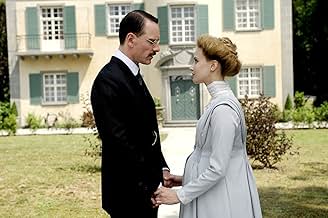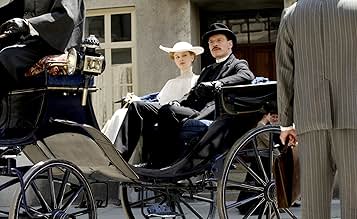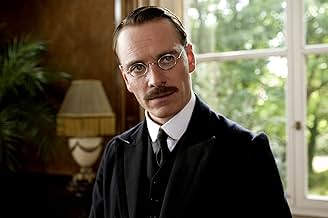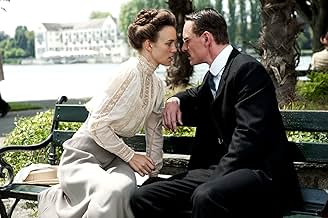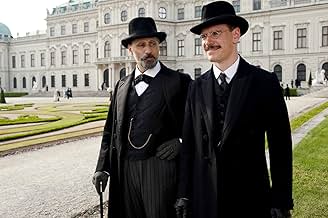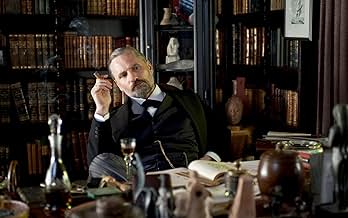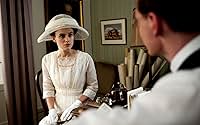Un regard sur la façon dont la relation intense entre Carl Jung et Sigmund Freud a donné naissance à la psychanalyse.Un regard sur la façon dont la relation intense entre Carl Jung et Sigmund Freud a donné naissance à la psychanalyse.Un regard sur la façon dont la relation intense entre Carl Jung et Sigmund Freud a donné naissance à la psychanalyse.
- Prix
- 19 victoires et 38 nominations au total
André Hennicke
- Prof. Eugen Bleuler
- (as André M. Hennicke)
Bjorn Geske
- Orderly
- (as Björn Geske)
Avis en vedette
I must admit, going into this film, I was rather excited; I've enjoyed both of David Cronenberg and Viggo Mortensen's previous collaborations and my interest in both Freudian psychology/psychoanalysis and Michael Fassbender practically guaranteed that I would be seeing this film. I fear now, however, that my expectations may have been a bit too high.
I must admit, however, that I thought that Michael Fassbender and Viggo Mortensen played their roles very well, although Mortensen definitely didn't receive as much screen time as he deserved. Vincent Cassel definitely shone in his extended cameo as Otto Gross. I did have some issues with Keira Knightly's acting, however. I feel like she may have over exaggerated her actions, particularly in the beginning scenes where she is in the midst of hysteria.
However, my real problem with this film is that, for lack of a better term, it all seems a little too shallow. Events that should be important are skimmed over and not explained; to be honest, it doesn't particularly seem like anything of real importance happens in the film. The characters have little depth; despite the fact that they are all playing rather well known persons, there simply isn't anything to them other than a name. On top of this, despite what the taglines of the film and trailer seem to suggest, the relationship between Freud and Jung is hardly explored. For the most part, their scenes involve reading letters from the other. This is hardly compelling viewing.
Overall, I feel like this film would have been better if it had been longer. If the film had a running time of even two hours, compared to one and a half, more character development could have been inserted, particularly for Freud. In addition, more focus on Jung's relationship with Freud, rather than his relationship with Spielrein, would have been nice to see.
Here's hoping that any future collaborations between Cronenberg and Mortensen pack a bit more of a punch.
I must admit, however, that I thought that Michael Fassbender and Viggo Mortensen played their roles very well, although Mortensen definitely didn't receive as much screen time as he deserved. Vincent Cassel definitely shone in his extended cameo as Otto Gross. I did have some issues with Keira Knightly's acting, however. I feel like she may have over exaggerated her actions, particularly in the beginning scenes where she is in the midst of hysteria.
However, my real problem with this film is that, for lack of a better term, it all seems a little too shallow. Events that should be important are skimmed over and not explained; to be honest, it doesn't particularly seem like anything of real importance happens in the film. The characters have little depth; despite the fact that they are all playing rather well known persons, there simply isn't anything to them other than a name. On top of this, despite what the taglines of the film and trailer seem to suggest, the relationship between Freud and Jung is hardly explored. For the most part, their scenes involve reading letters from the other. This is hardly compelling viewing.
Overall, I feel like this film would have been better if it had been longer. If the film had a running time of even two hours, compared to one and a half, more character development could have been inserted, particularly for Freud. In addition, more focus on Jung's relationship with Freud, rather than his relationship with Spielrein, would have been nice to see.
Here's hoping that any future collaborations between Cronenberg and Mortensen pack a bit more of a punch.
I am a Cronenberg fan. I think a History of Violence is one of the greatest films ever made! I also think Eastern Promises showed what happens when a great Director pairs with an awesome muse. I anticipated this film eagerly but after watching it I was left with mixed feelings. Perhaps this is because the script was not as tight as that of the first two films I mentioned. It was never going to be easy capturing something as abstract as psychoanalysis on film, yet I can say that this film does ramble on at times and it is slow. A History of Violence was slow but the pay off was fantastic. Here there was no pay off. We were shown the lives of three great, complicated minds and that was it. After reading about the lives of the three central characters I can safely say that perhaps this was not the film Cronenberg should have made about Freud. He opted respectfully for the less dramatic and more factual and I think this sacrifice could have hurt what could have been another Cronenberg/Mortensen smash-hit. That said, I also think Keira Knightley was a mis-cast and Mortensen and Fassbender were as perfect as ever. Looking forward to the next Cronenberg flick. This wasn't awful but I expected more.
This started very well, great cast, landscapes, scenography, characters etc. I loved the idea of to greatest psychology minds working together on improving therapy methods and changing the approach to curing people of their traumas and problems. Where i find the movie failed a bit is the story where the connections in the scenes are bit off. I got the feeling that it was jumping trough periods without any connection which i could put together. It seemed like there were years in gaps between couple of scenes where there wasn't any. Even if this followed only true life events of Jung and Freud it still leaves us with wanting more then just few dialogs and scratch on the surface of psychology treatments. Kinsey (2004) is a movie which is a good parallel example how a movie about similar subject can be and can be done brilliantly. Maybe movies about lives of both Jung and Freud are in order. So, all in all, i enjoyed watching it, everyone did a great job and gives you a good feeling after, it has minor gaps in the story which doesn't make you stick to the chair but definitely recommend it to everyone.
What was the source of conflict which caused a gulf to form between Sigmund Freud and Carl Jung? When we examine their personal and professional lives, what turning points shaped their theories? What were the storms which blew through the lives of Jung and Sabina Spielrein? These are some of the questions this film attempts to highlight, and in fact begins to touch upon.
Some of the most scintillating moments of "A Dangerous Method" are sexually bracing. But the audience is left feeling a bit orphaned. Do these carnal scenes truly address the significant thematic questions?
Here's my main beef with this film: I wanted to see more time spent on the rigorous conflict between Freud and Jung. I have a sincere interest in the life of Carl Jung, but in the end, I was not sufficiently satisfied. Having said that, the production design, scenery, and costuming were absolutely wonderful.
The somber, instinctual undercurrents of "A Dangerous Method" can be a bit hypnotic. But because the script suffers, I cannot fully come under its spell. As the rolling credits came up, I personally felt a bit deflated, as if a sweet was torn from my curious grasp. Although I think most films would do well with a tighter edit, this movie could have used an additional 30 minutes of character and plot development.
I appreciated the qualities which Fassbender brought to Carl Jung. Vincent Cassel was right on the mark as the impulsive Otto Gross. Jung's insecure wife Emma was tenderly portrayed by Sarah Gadon.
Although Keira Knightley tried her best to portray Sabina Spielrein, there were certain scenes where her delivery seemed pushed. I have long respected Viggo Mortensen, but I was not fully convinced by his affected portrayal of Freud.
So, who would I cast as Sabina? Emily Mortimer, Helena Bonham Carter, or Rachel Weisz come to mind. And how about the part of Freud? Ben Kingsley, Dustin Hoffman, or Geoffrey Rush could have added a riveting twist to this role.
Is there a doctor in the house? I will leave that for you to decide.
Some of the most scintillating moments of "A Dangerous Method" are sexually bracing. But the audience is left feeling a bit orphaned. Do these carnal scenes truly address the significant thematic questions?
Here's my main beef with this film: I wanted to see more time spent on the rigorous conflict between Freud and Jung. I have a sincere interest in the life of Carl Jung, but in the end, I was not sufficiently satisfied. Having said that, the production design, scenery, and costuming were absolutely wonderful.
The somber, instinctual undercurrents of "A Dangerous Method" can be a bit hypnotic. But because the script suffers, I cannot fully come under its spell. As the rolling credits came up, I personally felt a bit deflated, as if a sweet was torn from my curious grasp. Although I think most films would do well with a tighter edit, this movie could have used an additional 30 minutes of character and plot development.
I appreciated the qualities which Fassbender brought to Carl Jung. Vincent Cassel was right on the mark as the impulsive Otto Gross. Jung's insecure wife Emma was tenderly portrayed by Sarah Gadon.
Although Keira Knightley tried her best to portray Sabina Spielrein, there were certain scenes where her delivery seemed pushed. I have long respected Viggo Mortensen, but I was not fully convinced by his affected portrayal of Freud.
So, who would I cast as Sabina? Emily Mortimer, Helena Bonham Carter, or Rachel Weisz come to mind. And how about the part of Freud? Ben Kingsley, Dustin Hoffman, or Geoffrey Rush could have added a riveting twist to this role.
Is there a doctor in the house? I will leave that for you to decide.
A movie about Carl Jung and Sigmund Freud directed by David Cronenberg? That sounds surprising and interesting, to say the very least but the movie as it turned out, was far from anything interesting to watch.
There are really multiple causes. The first and foremost problem is obviously with its story. And not just only the story in itself but also the things its emphasizes and puts its focus on. It makes some bad choices with this, which makes this movie feel like a very dry and distant one.
The movie is mostly focusing on the 'romance' between Jung and his mental patient, played greatly by Keira Knightley. Nothing wrong with that, if only the romance was anything really romantic or something to feel involved with. It instead just feels wrong and dirty and besides isn't made all that believable. Why, out of all of his patients and opportunities he must have had in his life, does Carl Jung suddenly decide to have an affair with this particular woman? What was so different or intriguing about her? This movie really doesn't give you the answers to any of this.
And if you think that this movie is being one that is sort of showing the rivalry between Freud and Jung and their opposing psychology methods, you are completely wrong. There is never any interesting dynamic between the two of them, which is granted also due to the fact that Viggo Mortensen as Sigmund Freud, is hardly in the movie at all.
And don't know what their methods were and why there are still being used in today's psychoanalysis and why the both of them are being regarded as the two founding fathers of psychoanalysis? Don't expect this movie to show or tell you anything! It really remains on the surface all, as if it was afraid for its own subject and that it might loose some of its viewers with it.
In other words, the movie really isn't telling you anything interesting and it's mostly being an unusual romantic movie, you'll get very little out off.
All a same really, since the movie itself remains well made and acted out. It's a pretty good looking movie, with all of its historical sets and costumes and the actor's play their roles convincingly. It at least still makes the movie watchable but it's barely enough to keep you interested in it.
6/10
http://bobafett1138.blogspot.com/
There are really multiple causes. The first and foremost problem is obviously with its story. And not just only the story in itself but also the things its emphasizes and puts its focus on. It makes some bad choices with this, which makes this movie feel like a very dry and distant one.
The movie is mostly focusing on the 'romance' between Jung and his mental patient, played greatly by Keira Knightley. Nothing wrong with that, if only the romance was anything really romantic or something to feel involved with. It instead just feels wrong and dirty and besides isn't made all that believable. Why, out of all of his patients and opportunities he must have had in his life, does Carl Jung suddenly decide to have an affair with this particular woman? What was so different or intriguing about her? This movie really doesn't give you the answers to any of this.
And if you think that this movie is being one that is sort of showing the rivalry between Freud and Jung and their opposing psychology methods, you are completely wrong. There is never any interesting dynamic between the two of them, which is granted also due to the fact that Viggo Mortensen as Sigmund Freud, is hardly in the movie at all.
And don't know what their methods were and why there are still being used in today's psychoanalysis and why the both of them are being regarded as the two founding fathers of psychoanalysis? Don't expect this movie to show or tell you anything! It really remains on the surface all, as if it was afraid for its own subject and that it might loose some of its viewers with it.
In other words, the movie really isn't telling you anything interesting and it's mostly being an unusual romantic movie, you'll get very little out off.
All a same really, since the movie itself remains well made and acted out. It's a pretty good looking movie, with all of its historical sets and costumes and the actor's play their roles convincingly. It at least still makes the movie watchable but it's barely enough to keep you interested in it.
6/10
http://bobafett1138.blogspot.com/
Le saviez-vous
- AnecdotesThe age difference between Viggo Mortensen and Michael Fassbender is 19 years, just as it was between Sigmund Freud and Carl Jung.
- GaffesSabina Spielrein's closing history is incorrect. Her death, along with her 2 daughters, actually occurred in August 1942, not 1941. Their deaths were only 3 among 27,000 in the massacre that occurred in Zmievskaya Balka, Rostov-on-Don, Russia by German forces.
- Générique farfeluThis film is based on true events, but certain scenes, especially those in the private sphere, are of a speculative nature.
- ConnexionsEdited into 365 days, also known as a Year (2019)
- Bandes originalesExcerpts from Siegfried
by Richard Wagner, original publication by Schott Music GmbH & Co KG, Mainz, Germany, 1876.
Adapted by Howard Shore, published by South Fifth Avenue Publishing, 2010.
Meilleurs choix
Connectez-vous pour évaluer et surveiller les recommandations personnalisées
Détails
- Date de sortie
- Pays d’origine
- Sites officiels
- Langue
- Aussi connu sous le nom de
- A Dangerous Method
- Lieux de tournage
- Schloss Belvedere - Rennweg 6, Vienne, Autriche(Freud strolling in the garden)
- sociétés de production
- Consultez plus de crédits d'entreprise sur IMDbPro
Box-office
- Budget
- 15 000 000 € (estimation)
- Brut – États-Unis et Canada
- 5 704 709 $ US
- Fin de semaine d'ouverture – États-Unis et Canada
- 167 953 $ US
- 27 nov. 2011
- Brut – à l'échelle mondiale
- 30 519 436 $ US
- Durée1 heure 39 minutes
- Couleur
- Mixage
- Rapport de forme
- 1.85 : 1
Contribuer à cette page
Suggérer une modification ou ajouter du contenu manquant








